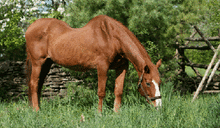Making sure your equine senior horse is in the best shape possible, and has some additional physical and nutritional support is key when it comes to getting them through the winter.

A senior horse
Make sure your senior horse is in the best shape possible and has additional physical and nutritional support to get him through the winter.
© 2017 by Equine Guelph
“You don’t want to wait until we’re in the dead of winter to find out your senior horse is too thin, too fat, or needs a winter blanket or better shelter,” says Laurie Cerny, editor of www.equineseniors.com. “By then it’s too late and your horse will suffer.”
Cerny offers these five tips to ensure your senior horse is winter ready:
1. Check teeth. If your horse has been on pasture (which is more palatable) you may not notice signs of tooth problems like picking though hay for softer stems, and wadding of hay that's been chewed. Have teeth floated if necessary.
2. Make sure your horse's feet are in good shape for ice and snow. This means staying on top of your blacksmithing and adding protective measures like rim pads (to help pop the snow out) and Borium (for traction) if your horse remains shod over the winter. Hoof supplements as well as regular application of a topical hoof dressing will also help hooves handle the ice and snow.
3. Protection from the elements. In addition to having adequate physical shelter like a run-in during the day and a stall at night, your equine senior may need to be blanketed. If your horse is on the thin side going into the winter - blanketing will help him/her conserve their body heat.
For horses with Cushing’s Disease (and grow an abnormally long hair coat) a waterproof blanket will help keep their coat from becoming soaked from rain or heavy snow. This will be a great help because a Cushing’s hair coat won't dry out as well as a normal hair coat.
Consider using a fly mask in the winter, too. It will help keep your senior horse's eyes from watering on days when it's really windy and will also help protect them from the harsh sun's glare on fresh snow.
4. Provide a warm water source. Like people, horse’s teeth become more sensitive with age. Now imaging drinking water that's barely 32 degrees. If you don't have water heaters, at least add warm water to your horse's drinking water several times during the day. The most common cause of colic in the winter is from lack of water consumption.
5. Measure your horse now so you can tell if it loses or gains too much weight over the winter. Because it is so hard to tell once a horse has a winter coat (Trying to use a blanket . . . that fits well in the summer – to determine weight loss or gain, doesn't work as a horse may have just lost muscle tone.)
Using a fabric tape measure take a measurement around the widest part of the neck and also around the barrel of your horse. Write these down somewhere in your barn, and re-measure your horse every couple of weeks.
www.equineseniors.com is devoted to the care and competition of equine senior horses. Find more articles and resources on caring for the senior horse, as well as product reviews, at the website.
